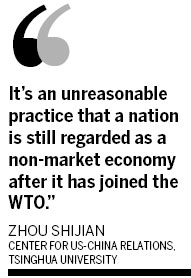US won't grant MES before 2016
(China Daily)
2010-05-12
Former trade official claims export controls not to blame for deficit
BEIJING - The United States is unlikely to accept China's market economy status (MES) before 2016 and both nations should act according to World Trade Organization (WTO) norms when launching trade remedy cases against each other, Susan G Esserman, a former deputy US trade representative, told China Daily.
Esserman, who served in the post during the Clinton administration, suggested China allow its currency rise, claiming that yuan revaluation was in China's interests and that US export controls were not a major source of the trade deficit with China.

She added that she did not expect the US to give the nod to China's MES before 2016 "as there are strong views about that in the US and there is no major change underway".
As a precondition to entering the WTO in 2001, China accepted some restrictive clauses, one of which was that China's MES could not be automatically granted worldwide until 2016.
New Zealand was the first nation to accept China's MES in 2004, and has been followed by 80 other nations and regions, but major economies such as the US and the European Union have yet to do so.
"It's an unreasonable practice that a nation is still regarded as a non-market economy after it has joined the WTO," said Zhou Shijian, a senior fellow at the Center for US-China Relations affiliated to Tsinghua University and a senior WTO expert.
"It is a double standard when the US declines to accept China's MES. The US aims to deliberately make things difficult for China, such as initiating more trade remedy cases," he said.
In 1998, the US and EU agreed to accept Russia's MES, but Russia has yet to enter the WTO.
Non-market economy status is a source of frequent trade remedy cases against China. During the past few years, China has become the major target of trade protectionism worldwide, with the US initiating the largest number of cases.
In August 2009, the US said it appreciated China's progress in market reform, and would accept China's MES as soon as possible through cooperation.
"It's no use pleading or waiting for their nod. We have to continuously push to force them to make some compromise," said Scott Liu from Scott Liu & Associates, a major law firm in charge of trade remedy cases concerning China and the US.
"China's currency issue is sensitive in the US. There is a wide array of expert opinion that the renminbi is undervalued and I think currency revaluation is in China's sovereign interest from a long-term perspective," said Esserman.
The US has claimed that an undervalued yuan is a major source of its huge trade deficit with China. But figures have proved currency fluctuations have no impact on trade balance as expected, and Chinese government said export restrictions set by the US are what had mainly led to the trade surplus with the US.
No comments:
Post a Comment
Comments always welcome!